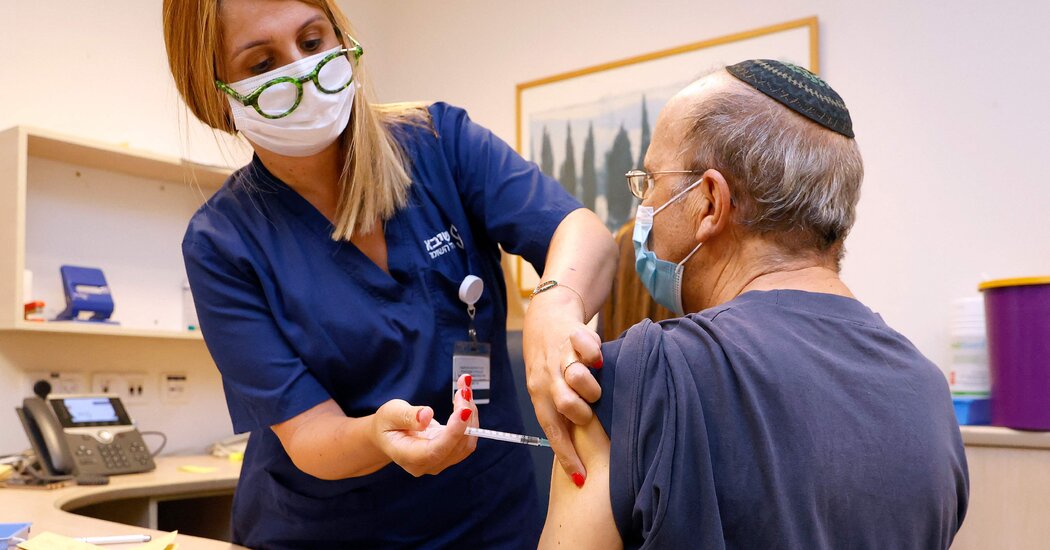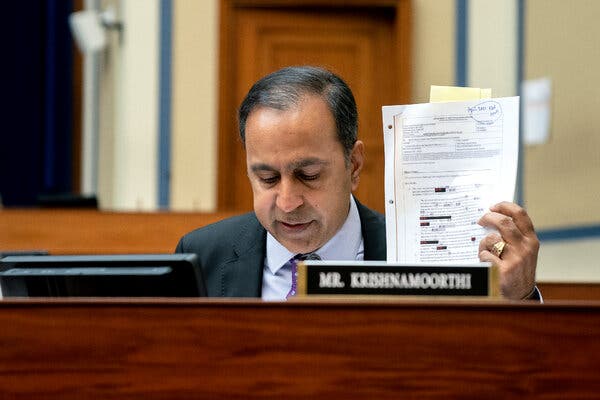Executives from Emergent, which ruined millions of coronavirus vaccine doses, divulged to Congress the scope of the regulatory review of its troubled Baltimore plant.WASHINGTON — The chief executive of Emergent BioSolutions, whose Baltimore plant ruined millions of coronavirus vaccine doses, disclosed for the first time on Wednesday that more than 100 million doses of Johnson & Johnson’s vaccine are now on hold as regulators check them for possible contamination.In more than three hours of testimony before a House subcommittee, the chief executive, Robert G. Kramer, calmly acknowledged unsanitary conditions, including mold and peeling paint, at the Baltimore plant. He conceded that Johnson & Johnson — not Emergent — had discovered contaminated doses, and he fended off aggressive questions from Democrats about his stock sales and hundreds of thousands of dollars in bonuses for top company executives.Emergent’s Bayview Baltimore plant was forced to halt operations a month ago after contamination spoiled the equivalent of 15 million doses, but Mr. Kramer told lawmakers that he expected the facility to resume production “in a matter of days.” He said he took “very seriously” a report by federal regulators that revealed manufacturing deficiencies and accepted “full responsibility.”“No one is more disappointed than we are that we had to suspend our 24/7 manufacturing of new vaccine,” Mr. Kramer told the panel, adding, “I apologize for the failure of our controls.”Mr. Kramer’s appearance before the House Select Subcommittee on the Coronavirus Crisis, which has opened a broad inquiry into his company, offered the public its first glimpse of the men who run Emergent, a politically connected federal contractor that dominates a niche market in biodefense preparedness, with the U.S. government as its prime customer.Testifying virtually, Mr. Kramer was joined by the firm’s founder and executive chairman, Fuad El-Hibri, who over the past two decades has expanded Emergent from a small biotech outfit into a company with $1.5 billion in annual revenues. Executive compensation documents made public by the subcommittee show that the company’s board praised Mr. El-Hibri, who cashed in stock shares and options worth more than $42 million last year, for “leveraging his critical relationships with key customers, Congress and other stakeholders.”Among those members of Congress is Representative Steve Scalise of Louisiana, the No. 2 House Republican and the top Republican on the House subcommittee. Federal campaign records show that since 2018, Mr. El-Hibri and his wife have donated more than $150,000 to groups affiliated with Mr. Scalise. The company’s political action committee has given about $1.4 million over the past 10 years to members of both parties.Mr. El-Hibri expressed contrition on Wednesday. “The cross-contamination incident is unacceptable,” he said, “period.”Mr. Kramer’s estimate of 100 million doses on hold added 30 million to the number of Johnson & Johnson doses that are effectively quarantined because of regulatory concerns about contamination. Federal officials had previously estimated that the equivalent of about 70 million doses — most of that destined for domestic use — could not be released, pending tests for purity.House Democrats began their inquiry into Emergent after The New York Times documented months of problems at the Baltimore plant, including failure to properly disinfect equipment and to protect against viral and bacterial contamination.Representative Raja Krishnamoorthi asked Mr. Kramer if he would consider turning over his bonus to American taxpayers.Stefani Reynolds for The New York TimesHours before the hearing began, committee staff members released confidential audits, previously reported by The Times, that cited repeated violations of manufacturing standards. A top federal manufacturing expert echoed those concerns in a June 2020 report, warning that Emergent lacked trained staff and adequate quality control.“My teenage son’s room gives your facility a run for its money,” Representative Raja Krishnamoorthi, Democrat of Illinois, told Mr. Kramer.Mr. Kramer initially testified that contamination of the Johnson & Johnson doses “was identified through our quality control procedures and checks and balances.” But under questioning, he acknowledged that a Johnson & Johnson lab in the Netherlands had picked up the problem. Johnson & Johnson hired Emergent to produce its vaccine and, at the insistence of the Biden administration, is now asserting greater control over the plant.The federal government awarded Emergent a $628 million contract last year, mostly to reserve space at the Baltimore plant for vaccine production. Among other things, lawmakers are looking into whether the company leveraged its contacts with a top Trump administration official, Dr. Robert Kadlec, to win that contract and whether federal officials ignored known deficiencies in giving Emergent the work.Mr. El-Hibri told lawmakers that the government and Johnson & Johnson were aware of the risks.“Everyone went into this with their eyes wide open, that this is a facility that had never manufactured a licensed product before,” he said. While the Baltimore plant was “not in perfect condition — far from it,” he argued that the facility “had the highest level of state of readiness” among the plants the government had to choose from.For Republicans, including Mr. Scalise, Wednesday’s session became a vehicle to defend Emergent and the Trump administration, and to raise other virus-related issues: the unproven theory that the coronavirus leaked from a laboratory in China, the “lies of the Communist Party of China,” mask mandates and the Biden administration’s call for a waiver of an international intellectual property agreement.“You are a reputable company that has done yeoman’s work to protect this country in biodefense,” exclaimed Representative Mark E. Green, Republican of Tennessee, adding, “So you gave your folks a bonus for their incredible work.”Emergent is skilled at working Washington. Its board is stocked with former government officials, and Senate lobbying disclosures show that the company has spent an average of $3 million a year on lobbying over the past decade. That is about the same as two pharmaceutical giants, AstraZeneca and Bristol Myers Squibb, whose annual revenues are at least 17 times higher.Democrats pressed Mr. Kramer and Mr. El-Hibri about their contacts with Dr. Kadlec, who previously consulted for Emergent. Documents show that Emergent agreed to pay him $120,000 annually between 2012 and 2015 for his consulting work, and that he recommended that Emergent be given a “priority rating” so that the contract could be approved speedily. Dr. Kadlec has said he did not negotiate the deal but did sign off on it.“Did you or any other Emergent executives speak to or socialize with Dr. Kadlec while these contracts were being issued?” Representative Nydia M. Velázquez, Democrat of New York, asked Mr. Kramer.“Congresswoman,” he replied carefully, “I did not have any conversations with Dr. Kadlec about this.”The government has so far paid Emergent $271 million, even though American regulators have yet to clear a single dose of vaccine produced at the Baltimore plant.Emergent was forced to halt operations a month ago after contamination spoiled the equivalent of 15 million Johnson & Johnson doses.Jim Lo Scalzo/EPA, via ShutterstockA Times investigation found that Emergent has exercised outsize influence over the Strategic National Stockpile, the nation’s emergency medical reserve; in some years, the company’s anthrax vaccine has accounted for as much as half the stockpile’s budget.The investigation found that some federal officials felt the company was gouging taxpayers — an issue that also came up at Wednesday’s hearing when Representative Carolyn B. Maloney, Democrat of New York, demanded to know how much it cost to make the vaccine and what it sold for. Mr. El-Hibri promised to supply the information later.Company executives also view their coronavirus work as one of the “prime drivers” of its 2020 revenues, according to a memorandum released on Wednesday by committee staff members. The executives were rewarded for what the company’s board called “exemplary overall 2020 corporate performance including significantly outperforming revenue and earnings targets.”Mr. Kramer received a $1.2 million cash bonus in 2020, the records show, and also sold about $10 million worth of stock this year, in trades that he said were scheduled in advance and approved by the company. Three of the company’s executive vice presidents received bonuses ranging from $445,000 to $462,000 each.Sean Kirk, the executive responsible for overseeing development and manufacturing operations at all of Emergent’s manufacturing sites, received a special bonus of $100,000 last year, in addition to his regular bonus of $320,611, in part for expanding the company’s contract manufacturing capability to address Covid-19, the documents show. Mr. Kirk is now on personal leave.Emergent officials “appear to have wasted taxpayer dollars while lining their own pockets,” Ms. Maloney charged.Mr. Krishnamoorthi asked Mr. Kramer if he would consider turning over his bonus to the American taxpayers.“I will not make that commitment,” Mr. Kramer replied.“I didn’t think so,” Mr. Krishnamoorthi shot back.Rebecca R. Ruiz
Read more →



